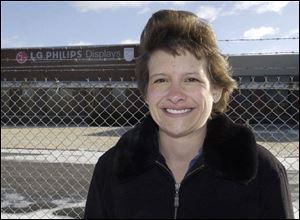
Lost jobs lead to new careers
1/23/2004
Anytime you go into something new, it s always frightening, says Lisa Alt, an ex-employee of LG Philips Display Components who will graduate today from the Apollo School of Nursing s satellite program.
OTTAWA, Ohio - Their jobs have gone south, victims of a free-trade agreement that helped shutter their manufacturing plant and their careers.
But 15 former employees of LG Philips Display Components in Ottawa, who were among hundreds who lost their jobs, will graduate today from careers in manufacturing to health care as the first class to complete Apollo School of Nursing s satellite program there.
“Anytime you go into something new, it s always frightening,” said Lisa Alt, a 10-year Philips employee who will be part of this evening s ceremony at Ottawa-Glandorf High School.
For Mrs. Alt, the licensed practical nursing classes allowed her to fulfill a longtime dream of pursuing a career in health care.
She deferred an opportunity after college in June, 1987, to accept a job with Marathon Oil Co. In 1992, she applied to Lima Technical College to study X-ray technology, but a job in human resources at Philips opened and the prospect of earning money won over studying.
“Money always came in the way,” she said. “I should have just gone down that avenue to begin with.”
When Philips showed its employees the door, Mrs. Alt and her co-workers became eligible for government-paid training because their job losses were related to the effects of the North American Free Trade Agreement. To be eligible, programs can t extend beyond two years.
Mrs. Alt plans to enroll in an additional medical course through Apollo before she takes her state exam. She hopes to land a job as an LPN with an employer that will help pay for studies toward a registered nurse degree.
Apollo Career Center is a joint vocational high school in Lima that offers adult workforce education and specialized business training programs. Last year, Apollo enrolled 516 students full time and 5,000 others in career-enhancement studies.
New graduates have plenty of jobs waiting once they pass their state nursing examinations, said Ruth Speakman, coordinator of Apollo s licensed practical nursing program.
The Lima campus graduated 41 nursing students from its 10-month program in August and all have found jobs, Ms. Speakman said.
Most of the Ottawa students will earn about the same as at Philips, where they assembled picture tubes before Putnam County s largest employer left for Mexico in a quest for lower production costs.
“With the nursing shortage, there should not be a problem,” Ms. Speakman said.
Apollo graduates are making between $12 and $18 an hour, said Ms. Speakman. Philips assembly workers were paid an average of $14 an hour.
She said the growing need for health-care professionals and attrition within the ranks of veteran nurses feeds the demand for graduates.
“[A lot of us] nurses have been around for quite a while and we re getting older and will be retiring,” Ms. Speakman said.
The loss of 1,158 jobs devastated the village of 3,999, about 65 miles southwest of Toledo. The Ohio Department of Job and Family Services says about 500 former workers have been approved for the assistance in various areas of study, including nursing.
But nearly a third remain unemployed. Some of them found jobs but have been laid off since.
For some Philips veterans, leaving a manufacturing environment for a new career caused a bit of anxiety, Mrs. Alt said.
“I could see a lot of fears,” said Mrs. Alt, mother of four children ages 1 to 11 years.
The first class held at the village fire department will graduate 15 former Philips workers and five other students. Tuition and books for the 10-month LPN course costs $6,000, Ms. Speakman said. Apollo will start a new LPN class March 1.
Ms. Speakman said the program s capacity is limited by the lack of clinical openings for students, who must spend 40 percent of their learning time in a hospital or nursing-home setting.
President Bush this week announced a proposal to fund partnerships between community colleges and employers to expand such programs as nurses training.
But Neal Eiber, director of Apollo s adult programs, doubts any of that money will filter down to his Lima school.
That plan, outlined in the President s State of the Union speech, Mr. Eiber said, likely will pass through two-year colleges and other higher education institutions, not through the state department of education, which funds Apollo.